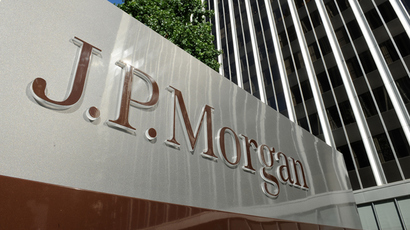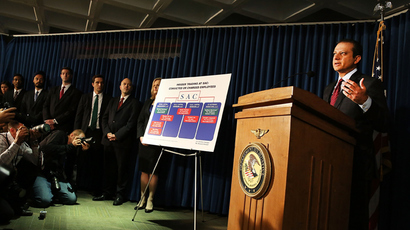‘Too big to fail’ status gives US banks ‘free pass’ – Fed study

While admitting that large US banks enjoy a natural advantage in financial markets, the new study fails to answer the question if new regulations on Wall Street will be able to tame the “too-big-to-fail” financial institutions.
The series of research papers, published on Tuesday by the US Federal Reserve, arrived at conclusions that sound more like good common sense in these post-crisis times: The larger financial institutions can do better business, as well as withstand sudden fluctuations in the markets compared to smaller banks simply because the bigger banks enjoy “too-big-to-fail” status.
Due to their sheer size, the economy can ill-afford for these institutions to be washed away in times of financial crisis, with critics fearing that the system has become dependent on taxpayer bailouts to keep the economy afloat.
The new research shows "it is improper to ask the taxpayer to underwrite the non-commercial banking operations of a complex bank holding company," Dallas Fed President Richard Fisher told Reuters in an interview.
Yet, despite legislation put forward by the Obama administration to shrink the size of US banks, the exact opposite trend appears to be happening on Wall Street. The top-10 banks in America now have combined assets of about $9.72 trillion dollars (the entire US economy produced $15 trillion in 2012, according to Fed records). In fact, unless you have a minimum of $223 billion in assets, forget about getting into the banking elite.
Top-10 US banks by assets (1Q 2013 rank)
1. JP Morgan Chase and Company $2.4 tn
2. Bank of America $2.1 tn
3. Citigroup Inc $1.9 tn
4. Wells Fargo & Co. $1.4 tn
5. Bank of New York Mellon Corp. $360 bn
6. U.S. Bancorp $353 bn
7. HSBC North American Holdings Inc. $322 bn
8. PNC Financial Services Group, Inc. $304 bn
9. Capital One Financial Corp. $296 bn
10. TD Bank US Holding Co $229 bn
Source: SNL Financial
The four top banks on the list - JPMorgan Chase, Bank of America, Citigroup and Wells Fargo - possess about $7.8 trillion in assets, up from $6.4 trillion at the time that the Great Recession made landfall in 2008.
Relying on data through 2009, which did not factor in post-crisis reforms, Fed analysts estimated that the funding advantage enjoyed by the five largest banks over their smaller competitors to be about 0.31 percent, which they said was “statistically significant.” The Fed said the studies represented the conclusions of their individual authors, not the central bank itself.
The Clearing House, which represents 17 of the world's largest
commercial banks, published a study last week by consulting firm
Oliver Wyman. It found the difference in funding costs between
large and small firms was negligible.
Outspoken critics in Congress argue the nation's biggest banks
are considered too imperative to the US economy to be allowed to
fail.
US Senator Sherrod Brown, an Ohio Democrat, called The Clearing House study an attempt by banks to "protect the status-quo that requires hardworking taxpayers to pay for their risky activities."
Meanwhile, other staunch critics of the US banking system, most notably Ron Paul, a three-time US presidential candidate, have sought the elimination of the Federal Reserve System altogether, arguing that it is the constitutional obligation of the US Treasury to control the nation’s money supply and interest rates.
Other critics point to the repeal of the Glass-Steagall Act, passed by Congress in 1933 following the Great Depression, which prohibited commercial banks from investing customer deposits into creative financial instruments such as sub-prime mortgages and credit default swaps, toxic, high-risk investments that helped bring the global economy to the abyss in 2008.

The New York branch of the Federal Reserve, which has influential ties with Wall Street, said its conclusions in the report should not be interpreted to mean it supports the breakup of the biggest banks. Such a move would “disrupt economies of scale that keep the cost of banking services low for most Americans,” they said, as quoted by Reuters.
Fed analysts have said government regulators should focus on banks' liabilities rather than trying to overhaul their structure.
Presently, government regulators are working to implement the 2010 Dodd-Frank Wall Street Reform Act, which critics say lacks any internal mechanism to prevent any future taxpayer bailout of the financial system.
Meanwhile, reckless behavior on the part of a few individuals continues to tarnish the world of finance.
“The banks are still gambling with FDIC-insured money,” Ted Kaufman, a former US Senator from Delaware, argued in July in Delaware Online. “The JPMorgan Chase "London Whale" fiasco was just the latest proof that there has been no change in the casino speculation of Wall Street banks.”
In April and May 2012, a single trader was believed responsible for accumulating trading losses of $2 billion at JPMorgan's London branch, with the actual loss expected to be substantially larger.
"No one has gone to jail. And no one will. There are many examples of criminal behavior during the meltdown, but not one megabank executive has been jailed. Without that deterrent, white-collar crime is not just profitable but inevitable,” Kaufman predicted.













